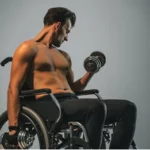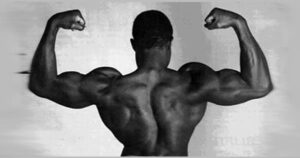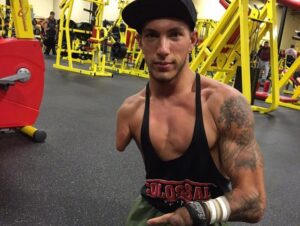Bodybuilding is a physical activity that involves resistance training with the goal of increasing muscle mass and strength. While it is often associated with competitive bodybuilding, the benefits of this type of training extend far beyond just aesthetics. In fact, bodybuilding can be particularly beneficial for individuals with disabilities.
People with disabilities often face unique challenges when it comes to physical activity, including reduced mobility, muscle weakness, and decreased endurance. However, research has shown that bodybuilding can help to address these issues and improve overall health and wellbeing.
In this article, we will explore the many health benefits of bodybuilding for people with disabilities. We will look at how this type of training can improve mobility, increase muscle strength, boost cardiovascular health, and enhance mental wellbeing. By understanding the benefits of bodybuilding for people with disabilities, we can encourage more individuals to engage in this activity and improve their quality of life.
The Health Benefits of Bodybuilding for People with Disabilities

# Improved Mobility and Flexibility
Bodybuilding for disabled people involves modified workouts that cater to their specific needs. These workouts may include resistance training using machines, free weights, or bodyweight exercises. The goal is to challenge the muscles to promote growth and strength, which in turn improves mobility and flexibility.
One way that bodybuilding can improve mobility and flexibility for disabled people is through strengthening the muscles around the joints. Many disabled individuals have weakened muscles around their joints due to lack of use or injury. This can lead to joint instability and limited range of motion. Bodybuilding can help by strengthening the muscles around the joints, providing stability and allowing for greater mobility and flexibility.
Additionally, bodybuilding can help improve posture, which is important for maintaining balance and preventing falls. Many disabled individuals have poor posture due to muscle imbalances and weakness. Bodybuilding can help address these issues by strengthening the muscles responsible for maintaining good posture, such as the back and core muscles.
Moreover, bodybuilding can help improve overall fitness and cardiovascular health, which is essential for maintaining mobility and flexibility. Many disabled individuals have limited mobility and may struggle with cardiovascular exercise. Bodybuilding can help by providing a low-impact form of exercise that can improve cardiovascular endurance, which can translate into better mobility and flexibility.
Bodybuilding for disabled people can be an effective way to improve mobility and flexibility. It involves modified workouts that cater to the specific needs of disabled individuals, and can help strengthen muscles, improve posture, and promote overall fitness and cardiovascular health. As with any exercise program, it is important to consult with a healthcare professional before beginning bodybuilding for disabled people to ensure safety and effectiveness.

# Increased Strength and Muscle Mass
Bodybuilding can be a beneficial exercise regimen for people with disabilities, as it can help increase strength and muscle mass while improving overall physical health. Here’s how bodybuilding for disabled people increased strength and muscle mass:
- Resistance Training: Bodybuilding focuses on resistance training, which involves using weights, resistance bands, or bodyweight exercises to challenge the muscles. This type of training is particularly effective at building strength and muscle mass, which can help disabled people perform daily activities more easily.
- Adapted Exercises: Many bodybuilding exercises can be adapted to suit the needs of people with disabilities. For example, someone who uses a wheelchair can still perform exercises such as bench presses, shoulder presses, and bicep curls using dumbbells or resistance bands. Adaptive equipment, such as seated leg press machines, can also be used to target specific muscle groups.
- Increased Bone Density: Resistance training has been shown to increase bone density, which can be particularly beneficial for people with disabilities who may be at higher risk of osteoporosis or other bone-related conditions.
# Improved Mental Health
Physical disabilities can often lead to mental health challenges such as depression, anxiety, and low self-esteem. However, engaging in bodybuilding can help individuals with disabilities overcome these challenges and improve their mental well-being in a number of ways.
- Improved Self-Esteem: Bodybuilding can help individuals with disabilities build confidence in their physical abilities and improve their self-esteem. As they see improvements in their strength and fitness, they may feel more confident in their ability to accomplish tasks and achieve their goals.
- Reduced Stress and Anxiety: Engaging in regular exercise, such as bodybuilding, has been shown to reduce stress and anxiety levels. This can be especially beneficial for individuals with disabilities who may experience higher levels of stress due to the challenges they face in their daily lives.
- Increased Sense of Control: Disability can often make individuals feel like they have little control over their lives. However, bodybuilding can provide a sense of control and empowerment as individuals are able to set and achieve fitness goals.
- Sense of Community: Engaging in bodybuilding can provide individuals with disabilities a sense of community and belonging. They may join a gym or fitness group where they can connect with others who share similar interests and challenges. This social connection can be a valuable source of support and motivation.
- Improved Mood: Exercise has been shown to release endorphins, which are hormones that improve mood and reduce pain. This can be especially beneficial for individuals with disabilities who may experience chronic pain or discomfort.

What safety considerations that people with disabilities should keep in mind when bodybuilding?
Here are some important safety considerations for people with disabilities who are interested in bodybuilding:
- Consult with a healthcare professional: Before starting any new exercise program, it is essential to consult with a healthcare professional, particularly if you have a disability. They can advise you on the types of exercises that are safe and appropriate for your condition, as well as recommend any modifications or adjustments that may be needed.
- Start slowly and progress gradually: It’s important to start with lighter weights and progress gradually to avoid injury. People with disabilities may need to start with even lighter weights than someone without a disability, and progress may be slower, but it is still important to challenge yourself within your abilities.
- Use proper equipment and form: Using proper equipment and form is crucial to avoid injury. Proper form means maintaining correct posture and alignment during exercises, and using the correct amount of weight for your abilities. If you need adaptive equipment or modifications to ensure proper form, consult with a fitness professional or physical therapist.
- Monitor your body’s response: Listen to your body and stop exercising if you experience any pain, discomfort, or shortness of breath. This is particularly important for people with disabilities who may have underlying health conditions or limitations that may make it difficult to complete certain exercises. Always work within your abilities and consult with your healthcare professional if you have any concerns.
- Be aware of your environment: Make sure your workout space is safe and accessible, with clear pathways and appropriate lighting. If you have a mobility or sensory impairment, you may need to modify your workout space to accommodate your needs.
- Consider working with a qualified trainer: A qualified trainer who has experience working with people with disabilities can help design a safe and effective workout program that is tailored to your specific needs and goals. They can also monitor your progress and make adjustments to your program as needed.
Let’s Sum Up
Bodybuilding can be a great way for people with disabilities to improve their physical health and overall well-being. By following these safety considerations, individuals with disabilities can minimize the risk of injury and maximize the benefits of their workouts.





